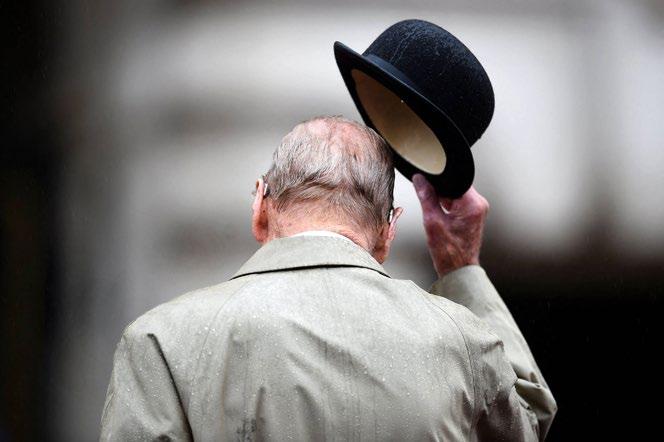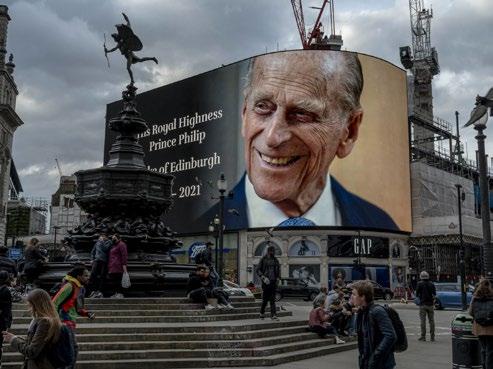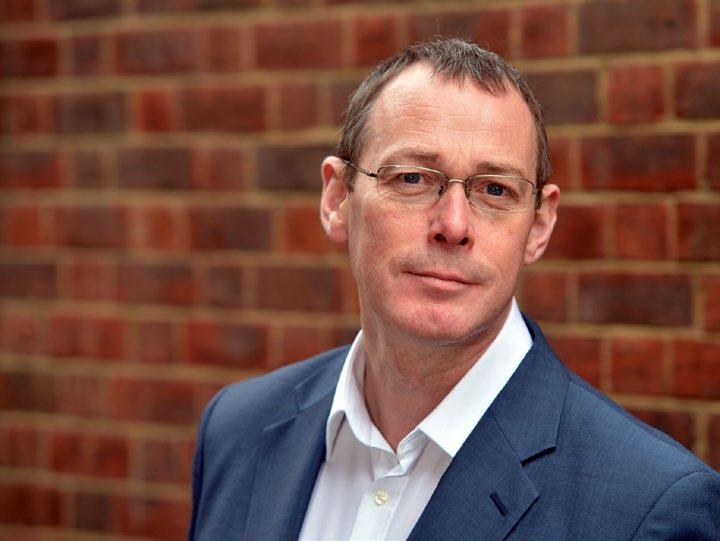
6 minute read
The royal watch
In the wake of Prince Philip’s death, Roger Mosey insists that broadcasters covering the Windsors must move with the times
‘M odernisation” is a dangerous word for broadcasters when it comes to coverage of the Royal Family. So, Journalism earns its practitioners attacks from both sides. Nicholas Witchell, who has covered the royals fairly and dispassionately for BBC news programmes, is regularly the subject of social media mobs alleging modernised most successfully. As The Crown reminds us, the reign of Elizabeth II began with deference and debutantes; now, Twitter is used to announce the death of Prince Philip. There have been Prince Andrewtoo, is “journalism” if it intrudes too far establishment bias. But Prince Charles shaped missteps in engaging with the into the ceremonial. Both are immedi- famously said: “I can’t bear that man. media, but the Palace has successfully ately construed by critics, especially I mean, he’s so awful, he really is.” embraced the digital world and it has those who like to bash the BBC, to In reality, the monarchy is one of the never been shy of using television as a mean the abandonment of tradition national institutions that has means to reach the people. and a lack of respect for the monarchy. It is completely right that the style There have been ceremonial punish- and tone of the broadcasters should ments in the national press for those change, too. I was in BBC News 20 years who ventured down the modernising ago when the Countess of Wessex was path. These have included the people taken ill, and we realised that she was in who tried new approaches in the tele- a category of senior royals that would vising of the Jubilee river pageant in have meant, if the worst had happened, 2012 and those of us implicated in the that all the networks would be merged scandal of the burgundy-coloured tie together for a major obituary. when Peter Sissons announced the We guessed that it might not be death of the Queen Mother, in 2002. quite what audiences expected for this
Advertisement
former employee of Capital Radio, however estimable. The broadcasters long ago dispensed with the idea that a royal death would be announced by the tolling of a bell for a full hour.
The deaths of Diana, Princess of Wales, and the Queen Mother were deftly handled by the schedulers. There was a short period in which the same content was broadcast across all channels and then an appropriate length of obituary programming on BBC One and ITV – followed by the reversion to a more normal schedule.
ITV went back to its regular programmes on the evening of Diana’s death, and BBC One likewise after the Queen Mother’s obituary.
Therefore it was a surprise to many when the death of Prince Philip generated a different response. The news teams were sure-footed in their announcements that he had died and in the subsequent coverage. But the programming ran at greater length and on more channels than many insiders had expected.
It had always been the case that controllers of BBC Two had a selection of programmes in their drawer for this kind of event: post-obit, they could run natural history shows or travelogues that were incapable of giving offence.
On 9 April, though, BBC Two ran the same royal content as BBC One from lunchtime until Newsnight. BBC Four was shut down altogether, even though its scheduled women’s football was still available on the red button and iPlayer. Viewing figures plummeted, and this became the most complainedabout schedule in the BBC’s history.
Clearly, this was a case of an abundance of caution. There was nothing much for the Daily Mail to complain about. But it shows the tightrope that broadcasters have to walk, because not offending one set of stakeholders managed to thoroughly cheese off others.
It also demonstrates that a lesson learnt at the time of the Queen Mother’s death hadn’t entirely sunk in: the death of a much-loved but aged figure is not regular “breaking news” and, once the announcement has been made and the prepared obituary played, there is not much more to say.
By hour five, the latest development may only be a statement of condolence from the leader of the Scottish Liberal Democrats. Viewers who tuned in at 1:00pm for the early reporting were bemused to see the same items going round and round on every channel for the rest of the day and into the night.
And it is curious that Gyles Brandreth telling semi-amusing anecdotes about Prince Philip can block out all the rest of the world’s news. Would anyone really have been offended by updates on Covid or international affairs?
The challenge, of course, is to be able to sense “the national mood” while events are unfolding, and it is an inexact science. I remember the meetings on the day of Diana’s death involving the Director-General of the time, John Birt, about when it felt “right” to change the tone. John oversaw the decision we took on Radio 5 Live about when to switch to alternative programming – we went to live tennis at 6:00pm – and at what point the phone lines should open to temper the “top-down” programming with voices that reflected feelings from around the country.
The vociferous response from viewers and listeners to the Prince Philip coverage turned out to be a useful corrective in the days between the death and the funeral. Schedules and news bulletins rapidly retrieved their balance; and the funeral itself was immaculately covered.
The BBC Studios events team, with director Claire Popplewell, is one of the corporation’s greatest assets. The UK is also lucky to have such strong news anchors in the likes of Huw Edwards, Tom Bradby, Julie Etchingham and Dermot Murnaghan.
It is, of course, inevitable that they will be back at Windsor at some point in the coming years for the death of the Queen. I am not sure we can yet imagine the scale of the national and global response to the end of the reign of Elizabeth II, and there must be no short-changing of this moment in British history.
It will also be different in that news will break: a new king will be proclaimed in all the nations of the UK and in countries around the world; ambassadors will have audiences at the Palace; new coins and banknotes will be prepared. But this is precisely where the journalism will be needed – to assess the constitutional significance and the level of public support – alongside the retrospectives and the respect.
All of this will be challenging at a time of national mourning, but it is necessary. Public service broadcasting is not easy in a digital world, and in a diverse, disputatious nation. But we should recognise that modernisation has happened and will continue – and that journalism is at the heart of what our broadcasters must offer. n

Getty Images
Roger Mosey is a former head of BBC Television News and is now the Master of Selwyn College, Cambridge.










